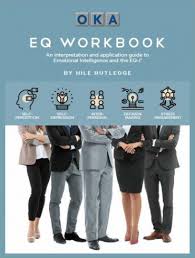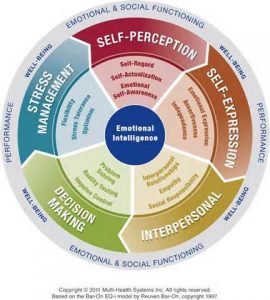Low EQ-i Scores Often Reflect Low Interest
Most of the time, people who lack engagement with or get a low score in a given element of the EQ-i have little interest in the work that would correct that EQ deficiency. It is often their lack of awareness of or the lack of perceived value in these underused EQ behaviors that leads to the low scores in the first place.
While some people are motivated into personal or professional development work through a longing for completeness or continued improvement (usually reflected in high Self-Actualization), most people take a far more pragmatic approach toward behavior change—only taking it on when the pain of NOT changing outweighs the pain of the new effort.

Behavioral Choices Have a Cost
This fact has led us at OKA to start talking to people, not about their EQ-i scores, but about the transaction cost of their typical behavior. If you show less of a given EQ element than most people, you will stand out—the less of that element you show, the more you will stand out. Engaging with an EQ element more than most people will similarly make you stand out. Behaviorally standing out is not necessarily bad—sometimes it is a uniqueness that brings with it great rewards, but the reality is that standing out from the group brings about a certain transaction, for which there is a cost.
If I show up less engaged with Interpersonal Relationships than most people in the group, I will appear (in comparison) a bit cold, unfriendly and hard to get to know. If I show up with less Impulse Control than most people around me, I will seem (and be labeled) rash, impetuous, impatient and too quick to speak.
In dealing with many whose EQ engagement with Interpersonal Relationships is lacking, I have not had great luck at motivating them by convincing them that relationship development is fun or emotionally satisfying; however, I have gotten many to agree that the negative feedback they receive due to their lack of Interpersonal Relationships (that they are cold, unfriendly and hard to get to know) is too “expensive.” The transaction cost for their behavior is too high, and it would be worth the pain and hassle of development to try to adopt some new ways of engaging with the group.
Motivating Change
Remember the best way to motivate many to work on their under-developed or less frequently engaged EQ elements is to discuss the “transaction cost” of their current behavior. Only when that cost is too high will the challenging task of behavior change be considered.
For a deeper dive on Emotional Intelligence and its application, consider OKA’s EQ Workbook, by Hile Rutledge, 
and learn more about OKA’s EQ-i Certification classes.

OKA can also support your team or program with Emotional Intelligence workshops (online or onsite), 360 assessment programs and individual coaching.
Other Blogs in this Series
This blog is Part of a 7-part series of EQ surprises and tips. Below are links to the other titles in the series. Enjoy the exploration.
- EQ Surprise #1 — There is no Emotional Intelligence on a Desert Island
- EQ Surprise #2 – Forget Your Emotional Intelligence Scores
- EQ Surprise #3 – The EQ-i Shock Block
- EQ Surprise #5 – The Most Important EQ-i Elements are the Toughest to Move
- EQ Surprise #6 – You Can’t Dial Back and Overdone Strength
- EQ Surprise #7 – Small Changes in Behavior Make Big Differences in EQ

Leave a Comment